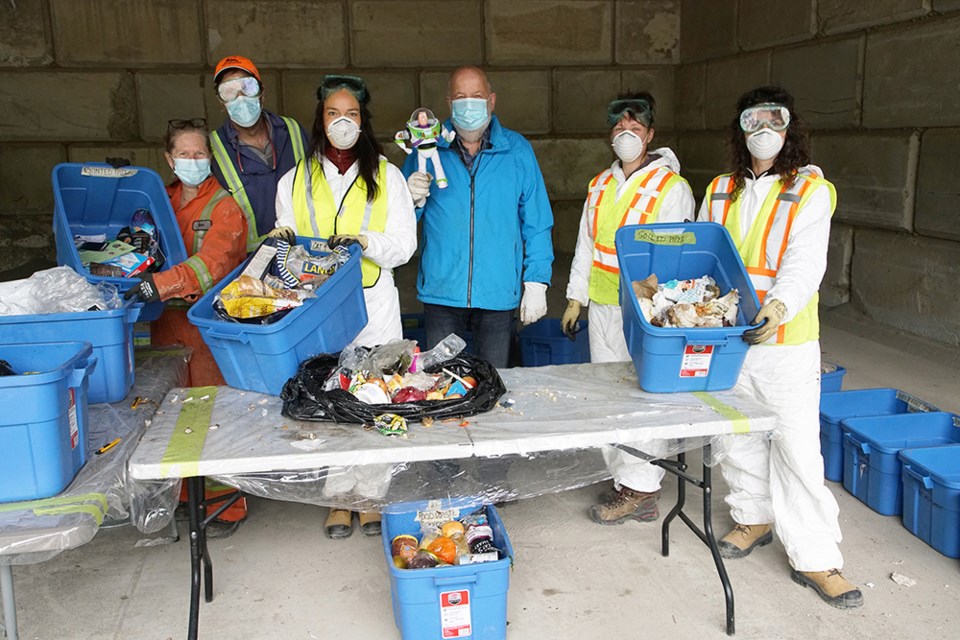qathet Regional District (qRD) directors have received a report on an audit carried out that reviewed the region’s solid waste stream.
At the June 24 regional board meeting, Let’s Talk Trash team member Tai Uhlmann said the study was to get a baseline of the solid waste to help inform programs and policies for the future.
The spring audit was carried out from May 25 to 29 at Augusta Recyclers. A second waste audit will be carried out in the fall and will give another snapshot of the waste, said Uhlmann.
“We can aggregate the data and make recommendations,” said Uhlmann.
Electoral Area E director Andrew Fall said he appreciated the effort that was undertaken, with all of the participants in the audit being in hazmat gear.
“Not all of the items were pleasant, I’m quite sure,” said Fall. “They may be interesting scientifically. I totally appreciate it because this is hard data that you don’t get any other way.
“It was really well done. The information is excellent. It’s a bit overwhelming because there is so much information.”
Fall said at a high level, two things stood out for him. One was the high percentage of waste that is organic. He said it’s more than 50 per cent of the composition when wood is factored in.
Fall said the waste sources were divided out into different categories, such as residential and industrial, commercial and institutional (ICI), and he was struck by the consistency for the amount of organics, household hygiene and plastics in the residential waste, ICI waste and the self-haul municipal solid waste.
“Those were pretty similar and I found that curious because I might have expected bigger differences when you have different sources,” said Fall. “This is useful information, and when the second phase comes out, combined it will be the most statistically valid numbers. It will be interesting if it can be compared.”
Fall said the audit had good news in that there are not a lot of refundable containers, good recyclables, hazardous waste or electronics.
“People are dealing with a lot of that properly and it was good to see,” said Fall.
Director relays privacy concerns
Electoral Area B director Mark Gisborne said he’d heard concerns from the public about garbage bags being opened. He said the concern was that there could be private information in the trash.
“The answer from this audit is very clearly, no,” said Gisborne. “What concerns me is there are some individuals who feel their trash should be private, and burned or destroyed before anyone can see it. With these audits going on, I’m just curious to hear from staff on what their thoughts are regarding doing these audits and opening up the trash bags.”
He said he was concerned about the prospect of an increase in backyard burning to alleviate privacy concerns.
Uhlmann said Gisborne brought up a good point, and one thing that could be potentially worked on is education, especially around removing labels from medication.
“That’s when we saw any identifying information,” said Uhlmann. “We chose to do the audit from random sampling so there wouldn’t be a preference on certain areas. We did it out of the way of everybody and nobody could tell we were going through the waste. I hear your concern.
“It is a deliverable in our solid waste management plan to do a waste audit, so we are following ministry recommendations.”
Manager of asset management and strategic initiatives Mike Wall said some municipalities insist on clear garbage bags now and won’t give service at curbside if clear bags aren’t used.
“What it’s really about is taking some responsibility, recycling properly and reducing your waste to landfill,” said Wall.
According to the audit report, through the audit process, approximately 3,500 kilograms of waste was sorted and weighed during the five-day audit period. There were 84 sorting categories those conducting the audit used for analysis of the solid waste stream.
Waste streams analyzed included residential municipal solid waste (MSW), ICI, self-haul MSW, self-haul construction, demolition and renovation (CD) waste and commercial CD waste.
In terms of residential waste, organics made up 44 per cent, household hygiene comprised 14 per cent and plastics were 12 per cent. There were also much smaller categories, such as CD, textiles, rubber, hazardous waste, electronics, multi-material items, paper, glass and metals.
In terms of the composition of the entire qRD waste stream, 27 per cent was organics, 24 per cent was wood and wood products, plastic was 10 per cent and CD was eight per cent. The organics comprised 75 per cent food waste, 12 per cent compostable paper, eight per cent donatable food and five per cent yard and garden waste. The wood waste comprised 46 per cent wood waste, 29 per cent divertible clean wood waste, 13 per cent non-divertible clean wood waste and 12 per cent non-divertible plywood and particle board.



